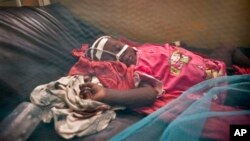The World Health Organization has approved the use of a meningitis vaccine for infants in sub-Saharan Africa. The vaccine has been given to older children and young adults for the past four years.
The WHO said the MenAfriVac vaccine meets international standards for quality, safety and efficacy and now can be used for children under one year of age.
It immunizes against meningitis A – a bacterial disease that causes inflammation of membranes surrounding the brain and spinal cord. The U.S. Centers for Disease Control and Prevention says it can kill within hours – and poses a threat to 450-million people in the so-called “meningitis belt.” The belt consists of 26 countries stretching from Senegal in West Africa to Ethiopia in the East.
The CDC said one in 10 people will die from meningitis A even when antibiotics are given. And one out of four survivors may be left with paralysis, blindness, hearing loss and seizures.
Dr. Marie-Pierre Préziosi is director of the Meningitis Vaccine Project – a partnership between the World Health Organization and PATH, a non-profit health organization. She said that meningitis has been a threat in parts of Africa for about 100 years.
“Based on the call from countries, the global health community came about with this project. And the project and its partners developed a vaccine – licensed it – and introduced it for mass vaccination campaigns. So this has been a tremendous success. And populations from one to 29 years of age are now protected,” she said
But she said it’s now important to extend that protection to infants.
“If we just stop there and don’t provide countries with tour de force sustainability in 10 [or] 15 years from now this massive epidemic will return because there will be [an] accumulation of susceptible persons in the population. Therefore, there was the need to adapt a vaccine for use in routine immunization in the youngest, in the infants. And this is the purpose of the current licensure and recommendation.”
Dr. Préziosi said the MenAfriVac vaccine offers protection against meningitis A for up to five years. But follow-up studies will be done to monitor the length of its effectiveness. Asked if there are any safety concerns, she said, “No, no safety concern. These conjugate vaccines are extremely safe.”
Meningitis A is spread from person to person.
“The only reservoir is human beings," she said.
The bacteria can be spread in respiratory droplets when a person sneezes, coughs, talks or even laughs.
The head of the Meningitis Vaccine Project said since the vaccine was introduced four years ago about 217-million people have been immunized. Another 100-million are expected to be vaccinated in the next few years. The meningitis vaccine is expected to become part of routine immunizations and given to 30-million infants a year in the meningitis belt.
The MenAfriVac vaccine costs less than a dollar per dose. The GAVI Alliance is picking half the cost in the first year of mass immunizations with individual countries paying the rest. GAVI is a public/private partnership that works to increase access to vaccines in poor countries. After the initial mass immunization, the cost gradually shifts to the countries.





